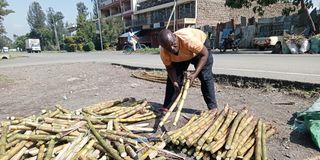Three Nakuru traders reveal the profitable side of sugarcane business

Albert Ogembo, arranging his sugarcane at his workplace near Afraha Stadium on June 3, 2024.
For Albert Ogembo, dawn begins with checking the sharpness of his knife, as he prepares for another day of selling sugarcane—a routine he has followed religiously for the past 18 years.
"A sharp knife ensures I can peel sugarcane quickly, making more money while satisfying impatient customers in a hurry," he says.
Ogembo observes that hot weather spikes the demand for sugarcane compared to colder days, with most people buying from noon when the sun is at its peak.
He also supplies sugarcane to juice makers in Nakuru city, sometimes selling up to 100 pieces a day, or even more if demand is high.

A pile of sugarcanes sit in Wakulima market awaiting buyers on June 3, 2024.
On a good day, the 50-year-old can make up to Sh. 4,000, a sum he says he'd never earn as an employee. He sells his sugarcanes for as low as Sh. 10 to Sh. 50 per cane.
Ogembo started this business after a friend introduced him to it, seeing it as a promising venture.
"The job has allowed me to educate my children and expand my workspace to store more sugarcane," he shares.
Enoch Busik, who started selling sugarcane in Pipeline three months ago, gets his stock twice a day and sells his cane at Sh. 30 per cane.

Enoch Busik (in a green shirt) picking his stock from a wholesaler on June 3, 2024.
He says he uses his bicycle for delivery and spends about Sh. 300 to Sh. 400 on stock daily.
Even in the cold season, he notes, it's rare to go home empty-handed as the market doesn't fluctuate much.
"The job has its challenges, like muscle strain after a hard day's work," Busik acknowledges.
He agrees with Ogembo that hot days bring better sales.
Joseph Atandi, a veteran wholesale sugarcane seller at Wakulima market for over thirty years, caters to various clients, including Mama Soko, vendors selling sugarcane from wheelbarrows, juice sellers, and walk-ins.

Joseph Atandi who has been selling sugarcane for over thirty years, during an interview on June 3, 2024.
He sells his sugarcanes for Sh. 15 to Sh. 30, depending on the sugarcane size and market value.
Though he now sells around 500 pieces a day down from 1,000 due to increased competition, Atandi insists the business remains sustainable.
His biggest challenge is dealing with customers who take goods on credit and fail to pay on time, or at all.
You will agree with me that nothing hits the spot like a juicy sugarcane on a sunny day, but there's nothing more disappointing than a tasteless one.
So how can you tell a sweet sugarcane?
“A sweet sugarcane is thin and yellow on the outside,” Ogembo advises.


